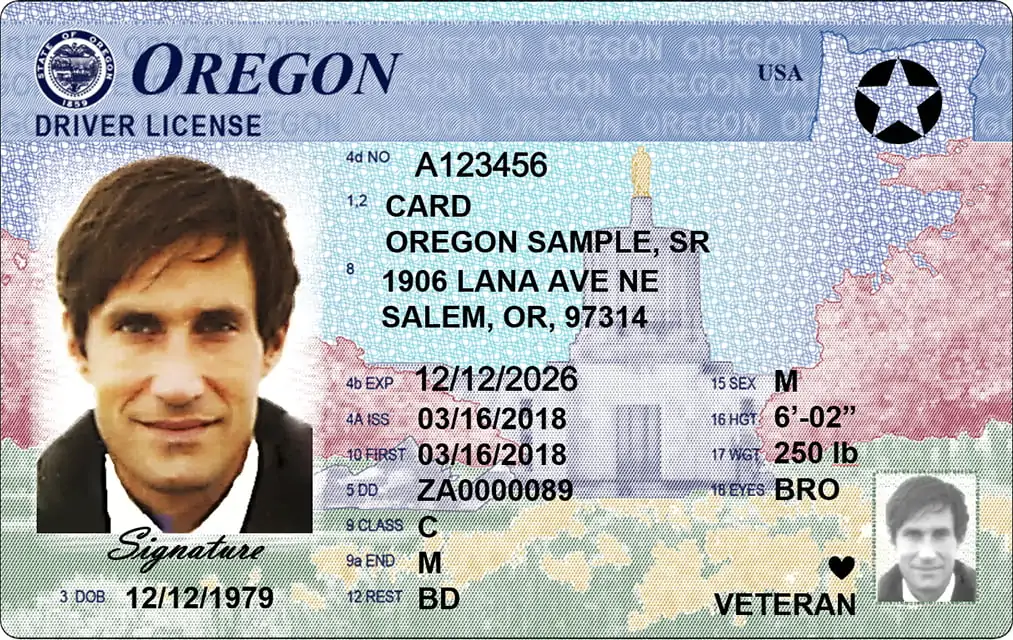Oregon
ID Scanning Laws
In Oregon, the use of ID scanning technology is permitted under certain conditions. The primary purposes for which a retailer, including a hotel, can retain and use information obtained from IDs include:
- Verifying a customer’s age
- Establishing a customer’s identity
- Confirming a customer’s license status to operate a vehicle
- Disclosing such information to another business for:
- Verifying a check payment
- Evaluating creditworthiness
- Detecting or reducing the risk of fraud, abuse, identity theft, or other crimes
- Collection activities
- Confirming that a customer has met the motor vehicle financial responsibility requirements
- Disclosing such information to:
- The department of transportation
- Insurance licensees
- Notaries
- Financial institutions if permitted by federal law
- Law enforcement agencies




Oregon State Legislature
ID Scanning Resources
The Legal Framework
Oregon ID Scanning Laws and Regulations
The Statutes
ORS 807.730: Failure to Notify Upon Change of Driver Address or Name
This statute outlines the responsibilities of individuals who have been issued a license or driver permit in Oregon. According to ORS 807.730, individuals are required to notify the Department of Transportation within 30 days of any change in their residence address, name, or place of employment. Failure to do so is considered a Class D traffic violation.
ORS 807.400: License or Permit Issued to Person Under 18 Years of Age
ORS 807.400 states that a person under 18 years of age may be issued a driver license or driver permit. However, the person must meet certain requirements, including passing the appropriate knowledge and drive tests.
ORS 807.021: Contents of Application
According to ORS 807.021, an application for a driver license, driver permit, or identification card must include the applicant’s full legal name, date of birth, sex, residence address, and signature.
ORS 807.110: Expiration and Renewal
ORS 807.110 outlines the expiration and renewal process for driver licenses and permits. It states that a license or permit expires on the licensee’s birthday in the eighth year after issuance.
ORS 807.130: Duplicate License or Permit
This statute states that the Department of Transportation may issue a duplicate license or permit if the original is lost, destroyed, or becomes illegible.
ORS 807.560: Failure to Notify Upon Change of Driver Address or Name
ORS 807.560 states that a person to whom a license or driver permit is issued commits the offense of failure to notify upon change of driver address or name if the person does not notify the Department of Transportation in a manner authorized by the department by rule upon any change of the person’s residence address, name, or place of employment.
ORS 807.620: Giving False Information to a Police Officer
ORS 807.620 states that a person commits the offense of giving false information to a police officer if the person knowingly uses or gives a false or fictitious name, address, or date of birth to any police officer who is enforcing motor vehicle laws.
In-Depth Analysis
Let’s delve deeper into these statutes and their implications for ID scanning in hotels.
Verifying Age and Identity
As per ORS 807.400 and ORS 807.021, a driver’s license or permit, which is commonly scanned in hotels for verification purposes, contains essential information such as the holder’s full legal name, date of birth, and sex. This information can be used to verify a customer’s age and identity, which is particularly important in hotels that sell alcohol, as they are required by law to ensure that they do not sell alcohol to minors.
Address Verification and Change of Address
ORS 807.730 and ORS 807.560 highlight the importance of maintaining up-to-date address information. When a hotel scans an ID, the address information obtained can be used for various purposes, such as billing or mailing. However, it’s crucial to remember that individuals are required to notify the Department of Transportation of any change in their residence address. Therefore, the address information obtained from an ID scan may not always be current.
Giving False Information
ORS 807.620 emphasizes the illegality of providing false information to a police officer. This is relevant in the context of ID scanning as it underscores the importance of authenticity in the information provided on IDs. If a hotel encounters an ID that appears to contain false information, it may be prudent to refuse service and report the incident to the authorities.
Tailoring for Hotel Use
For hotels, understanding these laws and regulations is crucial in ensuring they operate within legal boundaries. When a hotel scans an ID, the information obtained can be used to verify a customer’s age, particularly when selling alcohol, and to establish a customer’s identity, which is essential for security and record-keeping purposes.
However, hotels must also be aware of the limitations and requirements of these laws. For instance, they must understand that while they can use the address information obtained from an ID scan for certain purposes, this information may not always be current. Furthermore, they must be vigilant in ensuring the authenticity of the IDs they scan and be prepared to take appropriate action if they encounter an ID that appears to contain false information.
Please note that this information is intended to provide a general overview and does not constitute legal advice. Always consult with a legal professional for advice specific to your situation
Oregon Anti-Trafficking Network
Our Fight Against Human Trafficking



Knowledge Base
Frequently Asked Questions
Yes, hotels in Oregon can scan IDs for purposes such as verifying a customer's age, establishing a customer's identity, and confirming a customer's license status to operate a vehicle.
Hotels can retain information such as the customer's full legal name, date of birth, sex, and residence address. However, they must be aware that the residence address may not always be current.
Yes, hotels can disclose the information obtained from ID scans to another business for purposes such as verifying a check payment, evaluating creditworthiness, detecting or reducing the risk
If a hotel encounters an ID that appears to contain false information, it may be prudent to refuse service and report the incident to the authorities, as providing false information is illegal under Oregon law.
While there are no specific laws that govern the use of ID scanning technology in hotels, several statutes outline the general rules and regulations surrounding ID scanning and the use of the information obtained from IDs. These include ORS 807.730, ORS 807.400, ORS 807.021, ORS 807.110, ORS 807.130, ORS 807.560, and ORS 807.620.
Yes, according to Oregon law, one of the permitted uses of information obtained from IDs is to confirm a customer's license status to operate a vehicle. However, this is typically more relevant for businesses such as car rental companies than for hotels.
